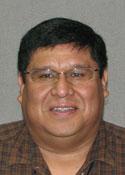Profiles of Members of the Native-American Community at EPA: Curtis Hicks
Profiles of Members of the Native-American Community at EPA

Curtis Hicks, Environmental Protection Specialist
Office of Environmental Justice and Tribal Affairs
Dallas, Texas
Where were you born?
Talihina, Oklahoma
What is your tribal affiliation?
Muscogee Creek
What brought you to EPA?
I had an opportunity to work for 15 years within three different tribal governments. While I wanted to make a career change, I also wanted to continue working with tribal organizations in some capacity. An old college friend told me about a vacancy in EPA, which I applied for. I was awarded an opportunity to work within the Region 6 Office of Environmental Justice, Tribal and International Affairs. It has been a very positive working experience and I feel very fortunate to continue working with tribal organizations and tribal communities.
Describe the type of work you do at EPA.
I work in grants management and also have tribal liaison duties. I work specifically with the General Assistance Program (GAP) grant and am assigned to work with 12 Nations in Oklahoma.
Did you go to vocational school or college? What was your major?
I studied at Bacone Junior College in Muskogee, Oklahoma, where I obtained an ALA, or Associate of Liberal Arts. After Bacone, I continued on to Northeastern State University in Tahlequah, Oklahoma, where I obtained a bachelor of science degree in secondary education and a master of science degree in secondary education administration. Later, I obtained a master of science degree in human resources administration from East Central University in Ada, Oklahoma.
What message would you like to send other American Indians/Alaska Natives who are considering college or a career in environmental protection?
I strongly encourage all Native American Indian/Alaska Natives to pursue a college education. One of the most important lessons I’ve learned over the years is that education is the key to obtaining independence, a good job, and a good career. Education does not have to be at a university, though. A vocational education can also help in reaching these goals. As a first generation college graduate in my family, I know firsthand that getting an education may be difficult, but very attainable.
